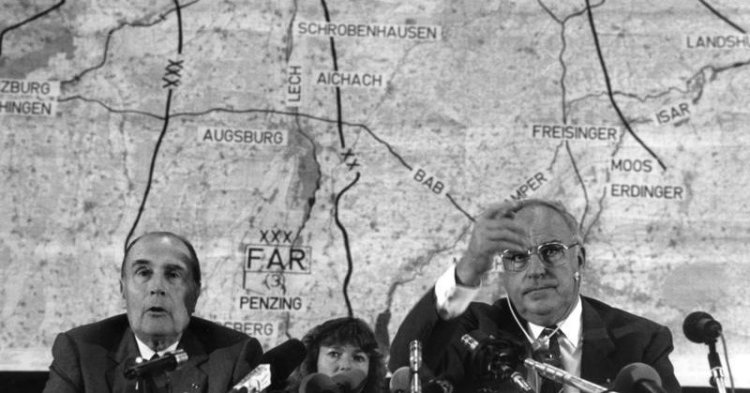The accession of the new Eastern Bundesländer to the Federal Republic of Germany on October 3rd 1990 didn’t make everybody happy – at least in its early days, in the autumn of 1989, when it was still only a future project. And at the forefront of those dissatisfied (or, at least, sceptical) French president François Mitterrand.
Over the past thirty years, documents have been released and archives have been opened, allowing historians to better understand the reaction of French politicians to the events of 1989-1990. In ‘Mitterand, l’Europe et la réunification allemande’ (Mitterand, Europe and German reunification), Daniel Vernet explains that the documents highlighted a series of misunderstandings between the French president and the chancellor Helmut Kohl. Misunderstandings which jeopardised the relationship between both leaders, as well as the Franco-German friendship.
Suspicions on all sides
Hélène Miard-Delacroix details these conflicts in ‘L’unification allemande et ses conséquences pour l’Europe, 20 ans après’ (German Reunification and its Consequences for Europe, 20 Years Later), where she identifies, first of all, one of Mitterrand’s fears: the creation of a new “Great Germany”, with new desires for domination on the continent. Kohl further fuelled the French president’s doubts when, on November 28th 1989, he presented his ten-point plan for Reunification. This caught his fellow European leaders by surprise: he had not warned anyone, not even Mitterrand, who believed he was seeing Germany embarking alone on new conquests.
There was another misunderstanding on December 6th, when Mitterrand met with Mikhaïl Gorbachev in Kiev where they discussed Germany, the fall of the Berlin Wall and the upcoming reunification. But for Kohl and other German leaders, this meeting was particularly unwelcome, all believing that the USSR and France wanted to decide for them, which would permit France to maintain its status as a great power. For some of these politicians across the Rhine, Mitterrand’s intention was clear: to stop reunification, or at least to slow it down.
European construction: the real source of tension?
Both sides’ fears dissipated throughout the year 1990, following several meetings and exchanges between the French president and the German chancellor. However, they did cast a chill on relations between both countries, and brought to light differing points of view beyond the question of reunification, stretching to the future of the European project. Indeed, months after the fall of the Wall, Mitterand pushed Germany to accelerate this development through the creation of an economic and monetary union – whereas for Kohl, the priority was to develop a political union. Reunification worsened this division, and made Mitterand fear that the Germans wanted to slow down the European construction to the benefit of their domestic politics.
If in the early 1990s, some suspected the French president of opposing Reunification. Over the past decades, access to archives and testimonies has allowed for a new perspective on France’s ambiguous position. Indeed, Mitterand was always interested by this question: since 1981, when he first took office, he addressed the topic with Helmut Schmidt, Kohl’s predecessor in the chancellery. For the French president, there was no doubt that Reunification was coming, certainly even sooner than the two German chancellors imagined, because it was bound to follow the natural course of history.


Follow the comments: |
|
